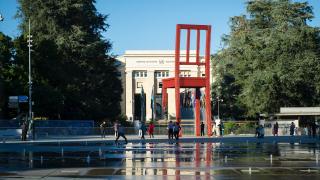
On Tuesday 29 September UNA-UK advisor, and former Head of Policy, Fred Carver appeared as a witness in front of the House of Commons Foreign Affairs Committee to give evidence on the UK’s role in strengthening multilateral institutions.
Mr. Carver appeared, along with Benjamin Ward, UK Director of Human Rights Watch, Hillel Neuer, Executive Director of UN Watch, and Peggy Hicks and Mahamane Cissé-Gouro of the UN Office of the High Commissioner for Human Rights (OHCHR) to give evidence on UN Human Rights work, and specifically the UK’s role within it.
He argued that the OHCHR’s critical value “is speaking truth to power, talking about the things within the UN system no one else will talk about.”
“The Human Rights Council holds value in its universality, it is every state in the world, and so the conception of human rights they put forward is human rights as it is understood by the entire world, not the agenda of any one state or any one group of states.”
Mr. Carver, Mr. Ward and Mr. Neuer went on to discuss further points around the UN human rights system, from issues around Human Rights Council (HRC) elections, the role of superpowers, meaningful reform, and how the UK can more effectively lead in human rights forums.
On the question of HRC membership Mr. Carver noted:
“The membership of the Human Rights Council is not what it should be, but I think we need to look at the reasons why that is. Far too often, blank slates are fielded for elections…I think that the real challenge for a country like the UK is encouraging allies and states that it would like to see on the Human Rights Council to challenge and to make sure that these elections are contested. I also think that there is work that could be done on capacity building on small island development states, just to encourage more candidates to stand.”
The absence of this approach has subsequently been borne out by the most recent round of elections to the Human Rights Council. Elections in four of the five UN regions were entirely uncontested, while in Asia only five candidates stood for four seats, meaning that while Saudi Arabia (with 90 votes) was - uniquely - unsuccessful in its attempt to gain election, the absence of acceptable alternatives meant that a number of potential perpetrators of atrocity crimes were elected.
Human rights organisations including Human Rights Watch and the Global Coalition on the Responsibility to Protect had been encouraging states to refuse to cast their votes rather than voting for rights violators in the hope of preventing states from reaching the 97 votes necessary to be elected, and so forcing further rounds of election. After three election rounds, states would have the ability to draft fresh candidates. However, ultimately all victorious states were elected comfortably.
China was the closest to requiring a second round, winning 138 votes in a contested race, securing a seat by 41 votes. Russia, with 158 votes, was the least successful of those who faced no opposition (meaning that 31 countries cast no vote rather than voting for them). But with a mere 165 votes, fewer than countries such as Pakistan and Uzbekistan that faced actual opposition (with 168 each) the UK was only marginally better supported. The most popular country was Senegal who received 188 of a possible 189 votes (Comoros, Sao Tome and Principe, Somalia, and Venezuela have had their voting rights suspended due to late payment of dues).
Mr. Carver gave three further suggestions of ways that, in addition to improving the system of elections, the UK and others could work to improve the efficacy of UN human rights work:
- Rather than trying to reform the institution, we have to try to reform the politics of the states within the institution. The ‘Irish Principles’ establish objective criteria for how the Human Rights Council should act - giving an objective way for member states to approach country-specific situations. The UK should champion these principles, and increase its funding to OHCHR, thus strengthening the capacity of the UN’s human rights mechanisms to promote objectivity.
- Strengthen the bridge between UN processes in Geneva and in New York, in the UN Security Council, where the UK has a seat, and in the UN General Assembly. The UK should work to corral states to defend funding for human rights mechanisms within the UN system, particularly at the Fifth Committee of the UN General Assembly.
- Stand up for human rights defenders by linking the UK's work at the human rights council with protection work by embassies around the world to safeguard activists who engage with the UN from reprisals. This could helpfully form a part of the wider strategy of atrocity prevention that UNA-UK has been encouraging the UK to adopt.
For more details on the evidence, and to find full transcripts of statements follow this link. You can also watch the session here.
Photo: A view of the Place des Nations, which features fountains and the “Broken Chair” sculpture, outside the Palais des Nations, seat of the UN Office at Geneva (UNOG). c. UN Photo/Rick Bajornas






